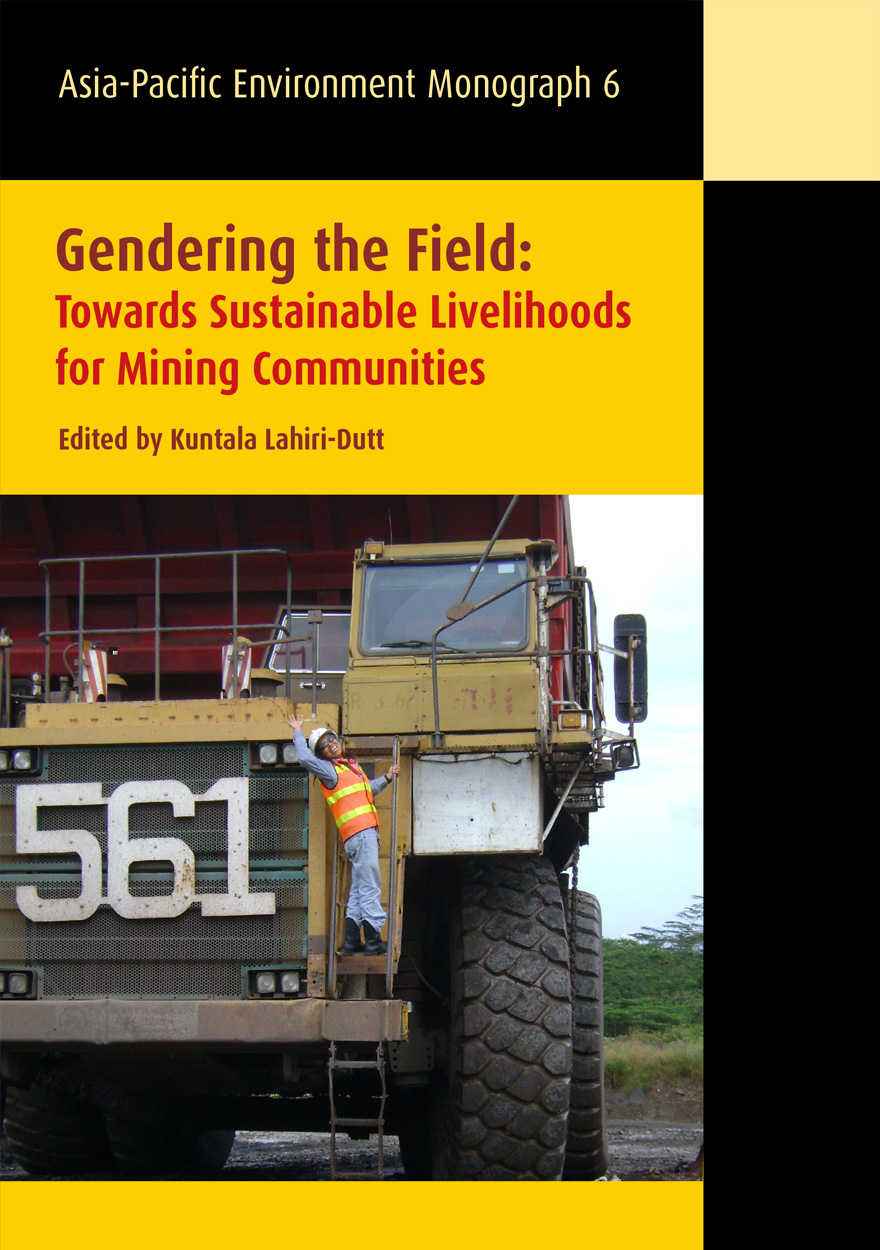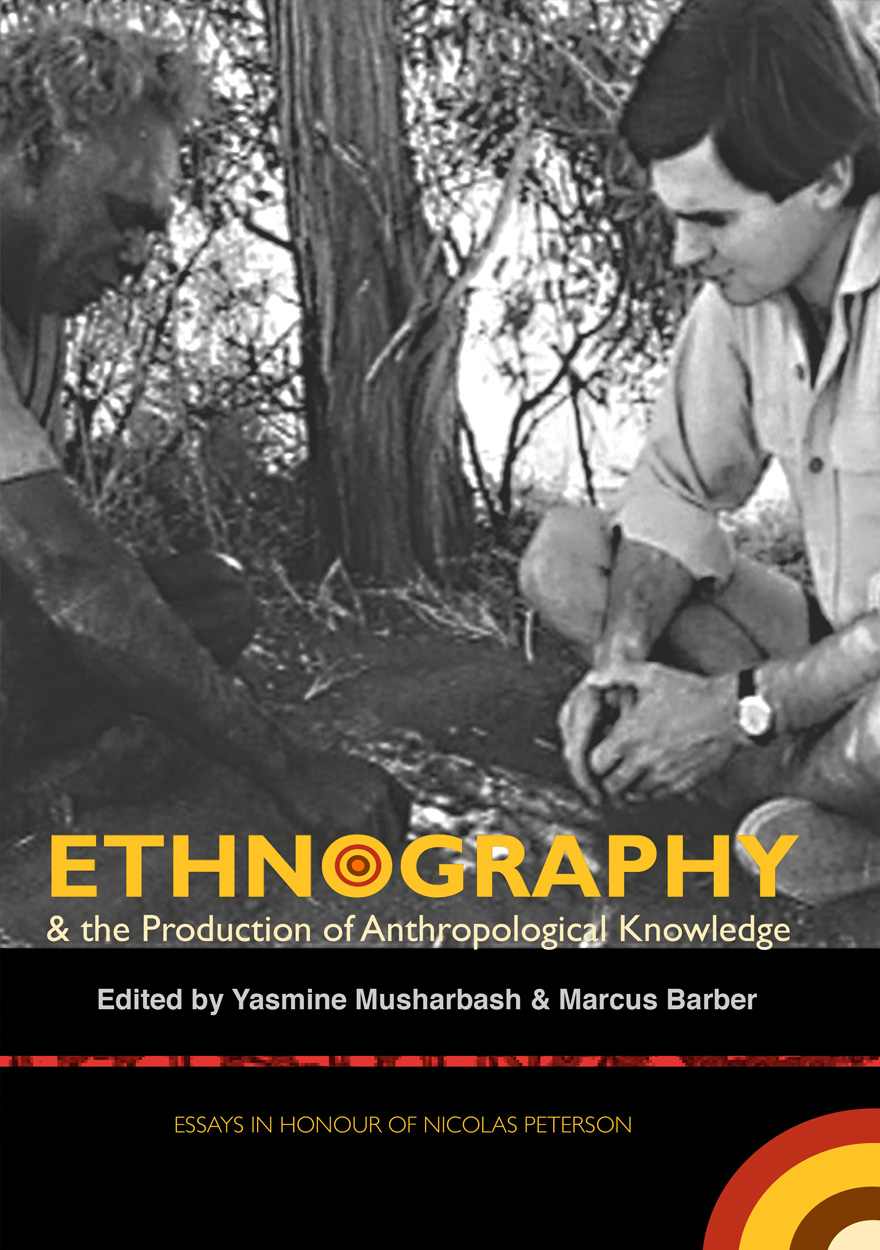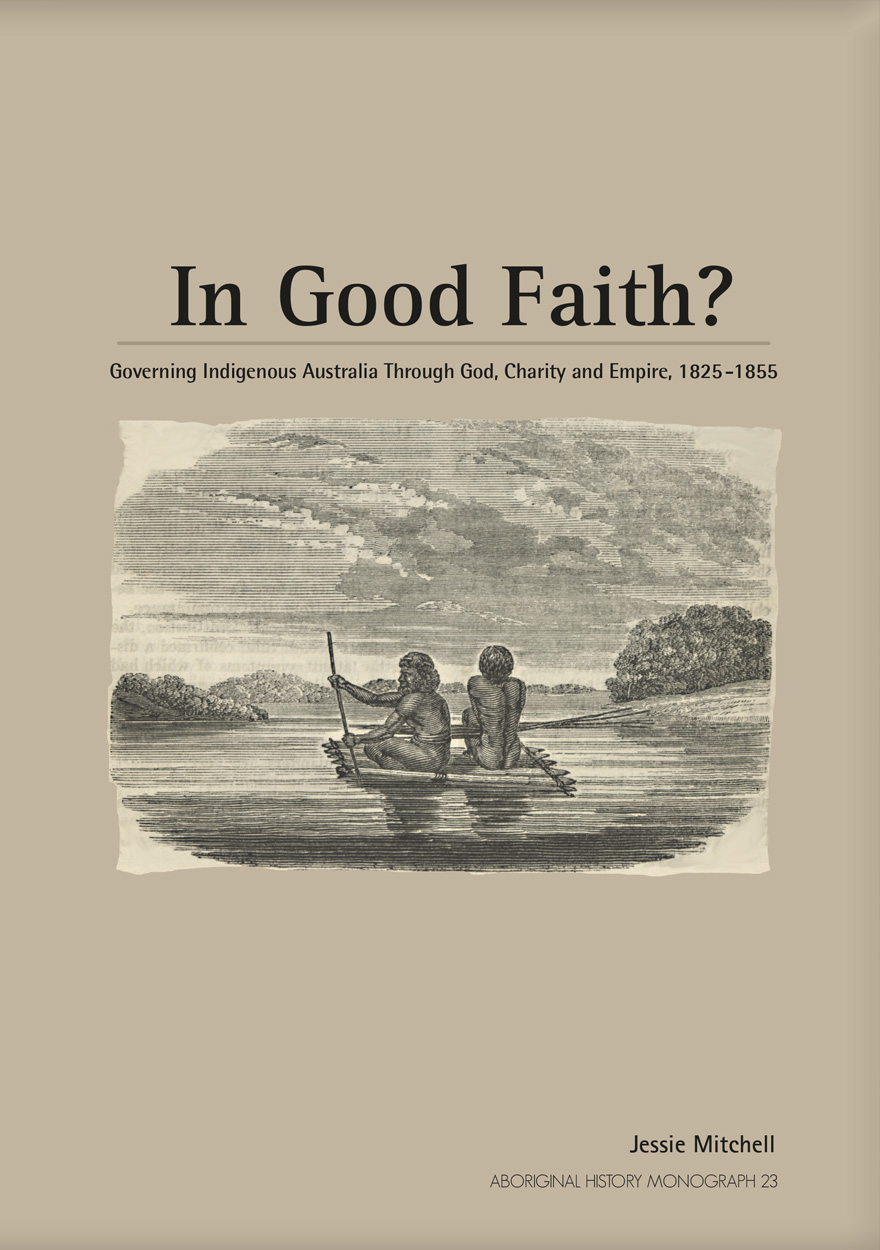Search titles
Displaying results 61 to 70 of 248.

Gendering the Field »
Towards Sustainable Livelihoods for Mining Communities
Edited by: Kuntala Lahiri-Dutt
Publication date: March 2011
The chapters in this book offer concrete examples from all over the world to show how community livelihoods in mineral-rich tracts can be more sustainable by fully integrating gender concerns into all aspects of the relationship between mining practices and mine affected communities. By looking at the mining industry and the mine-affected communities through a gender lens, the authors indicate a variety of practical strategies to mitigate the impacts of mining on women’s livelihoods without undermining women’s voice and status within the mine-affected communities.
The term ‘field’ in the title of this volume is not restricted to the open-cut pits of large scale mining operations which are male-dominated workplaces, or with mining as a masculine, capital-intensive industry, but also connotes the wider range of mineral extractive practices which are carried out informally by women and men of artisanal communities at much smaller geographical scales throughout the mineral-rich tracts of poorer countries.

Prime Ministers at The Australian National University »
An Archival Guide
Authored by: Michael Piggott, Maggie Shapley
Publication date: March 2011
The ANU Archives holds records about all 27 Australian prime ministers in the Noel Butlin Archives Centre and in the university's own archives. Prime ministers have been supporters, visitors, Council members, fellows, students, and even Chancellor of the Australian National University. Prime ministers have also been trade unionists and businessmen, and have been lobbied by trade unions, companies and industry associations, leaving their traces in the business and trade union collections of the Noel Butlin Archives Centre.
The authors, Michael Piggott (Australian Prime Ministers Centre fellow) and Maggie Shapley (ANU University Archivist), bring their considerable archival knowledge to the task of mapping prime ministers in the archival landscape and highlighting the prime ministerial riches which are found in the archives. The guide offers an extensive listing of relevant subject and personal files, minutes of meetings, rare printed items, photographs and audiovisual material, dating from the 19th to the 21st century, and ten short studies showing how these records might be used.

Ethnography & the Production of Anthropological Knowledge »
Essays in honour of Nicolas Peterson
Edited by: Yasmine Musharbash, Marcus Barber
Publication date: February 2011
Professor Nicolas Peterson is a central figure in the anthropology of Aboriginal Australia. This volume honours his anthropological body of work, his commitment to ethnographic fieldwork as a source of knowledge, his exemplary mentorship of generations of younger scholars and his generosity in facilitating the progress of others. The diverse collection produced by former students, current colleagues and long-term peers provides reflections on his legacy as well as fresh anthropological insights from Australia and the wider Asia-Pacific region. Inspired by Nicolas Peterson’s work in Aboriginal Australia and his broad ranging contributions to anthropology over several decades, the contributors to this volume celebrate the variety of his ethnographic interests. Individual chapters address, revisit, expand on, and ethnographically re-examine his work about ritual, material culture, the moral domestic economy, land and ecology. The volume also pays homage to Nicolas Peterson’s ability to provide focused research with long-term impact, exemplified by a series of papers engaging with his work on demand sharing and the applied policy domain.

In Good Faith? »
Governing Indigenous Australia through God, Charity and Empire, 1825-1855
Authored by: Jessie Mitchell
Publication date: January 2011
In the early decades of the 19th century, Indigenous Australians suffered devastating losses at the hands of British colonists, who largely ignored their sovereignty and even their humanity. At the same time, however, a new wave of Christian humanitarians were arriving in the colonies, troubled by Aboriginal suffering and arguing that colonists had obligations towards the people they had dispossessed. These white philanthropists raised questions which have shaped Australian society ever since.
Did Indigenous Australians have rights to land, rationing, education and cultural survival? If so, how should these be guaranteed, and what would people have to give up in return? Would charity and paternalism lead to effective government or dismal failure – to a powerful defence of an oppressed people, or to new forms of oppression?
In Good Faith? paints a vivid picture of life on Australia’s first missions and protectorate stations, examining the tensions between charity and rights, empathy and imperialism, as well as the intimacy, dependence, resentment and obligations that developed between missionary philanthropists and the people they tried to protect and control. In this work, Mitchell brings to life hitherto neglected moments in Australia’s history, and traces the origins of dilemmas still present today.
For more information on Aboriginal History Inc. please visit aboriginalhistory.org.au.

Geology at ANU (1959–2009) »
Fifty years of history and reminiscences
Edited by: Judith Caton
Authored by: Mike Rickard
Publication date: December 2010
This history was undertaken to celebrate the 50th anniversary of the Geology Department at ANU, and to honour its founding professor David A. Brown. It includes contributions from some 100 former students outlining their career successes.
This history was compiled by Dr Mike Rickard, a staff member of the Department of Geology from 1963 to 1997, who also served as Head of Department for seven years. He graduated BSc and PhD from Imperial College London in 1957 and has specialised in mapping the structure of mountain chains in Ireland, Canada, Norway, and southern South America. He also mapped volcanic rocks for the Geological Survey of Fiji. He taught Structural Geology and Tectonics and has supervised field work in south eastern and central Australia. After retirement he has taught U3A courses in Earth Science.

Indigenous Participation in Australian Economies »
Historical and anthropological perspectives
Edited by: Ian Keen
Publication date: December 2010
This volume seeks to contribute to the body of anthropological and historical studies of Indigenous participation in the Australian colonial and post colonial economy. It arises out of a panel on this topic at the annual conference of the Australian Anthropological Society, held jointly with the British and New Zealand anthropological associations in Auckland in December 2008. The panel was organised in conjunction with an Australian Research Council (ARC) Linkage Grant project on Indigenous participation in Australian economies involving the National Museum of Australia as the partner organisation and the School of Archaeology and Anthropology at The Australian National University.
The chapters of the volume bring new theoretical analyses and empirical data to bear on a continuing discussion about the variety of ways in which Indigenous people in Australia have been engaged in the colonial and post-colonial economy. Contributions cover settler capitalism, concepts of property on the frontier, Torres Strait Islanders in the mainland economy, the pastoral industry in the Kimberley, doggers in the Western Desert, bean and pea picking on the South Coast of New South Wales, attitudes to employment in general in western New South Wales, relations of Aboriginal people to mining in the Pilbara, and relations with the uranium mine and Kakadu National Park in the Top End. The chapters also contribute to discussions about theoretical and analytical frameworks relevant to these kinds of contexts and bring critical perspectives to bear on current issues of development.

Information Systems Foundations: The Role of Design Science »
Edited by: Dennis Hart, Shirley Gregor
Publication date: December 2010
This volume presents papers from the fourth biennial Information Systems Foundation Workshop, held at The Australian National University in Canberra from 2–3 October, 2008. The focus of the workshop was, as for the others in the series, the foundations of Information Systems as an academic discipline. The emphasis in this workshop was on the movement known as ‘Design Science’ and its importance in practical disciplines such as Information Systems. The chapters in the volume provide a critical examination of current design science ideas, with the role of human creativity given special mention. The philosophical underpinnings of design science thinking are also examined. Practically, the volume shows how the design science approach can be used in academic research that leads to artefacts that add value for individuals, organizations and society.

The Rudd Government »
Australian Commonwealth Administration 2007–2010
Edited by: Chris Aulich, Mark Evans
Publication date: December 2010
This edited collection examines Commonwealth administration under the leadership Prime Minister Kevin Rudd from 2007-2010. This was a remarkable period in Australian history: Rudd’s government was elected in 2007 with an ambitious program for change. However, as the chapters in this book demonstrate, these ambitions were thwarted by a range of factors, not the least being Rudd’s failure to press ahead when he confronted ‘road blocks’ such the ETS or managing his massive agenda which constantly elevated issues to ‘first order priority’. Although he started his term with stratospheric approval ratings, only two years later his support had collapsed and on 24 July 2010 he became the first sitting Prime Minister to be removed by his own Party before the expiry of his first term.
In this book, expert contributors consider the Rudd Government’s policy, institutional and political legacy. The 14 chapters are organized into four sections, outlining the issues and agendas that guided Rudd’s government, changes to the institutions of state such as the public service and parliament, followed by discussions of key issues and policies that marked Rudd’s term in office. The final section examines Rudd’s leadership and reflects on the personal foibles and political factors that brought his Prime Ministership undone. The Rudd Government has been produced by the ANZSOG Institute for Governance at the University of Canberra. It is the tenth in a series of books on successive Commonwealth administrations. Each volume has provided a chronicle and commentary of major events, policies and issues that have dominated successive administrations since 1983. As with previous volumes in the series, contributors have been drawn from a range of universities and other organisations.

Demographic and Socioeconomic Outcomes Across the Indigenous Australian Lifecourse »
Evidence from the 2006 Census
Authored by: Nicholas Biddle, Mandy Yap
Publication date: December 2010
Across almost all standard indicators, the Indigenous population of Australia has worse outcomes than the non-Indigenous population. Despite the abundance of statistics and a plethora of government reports on Indigenous outcomes, there is very little information on how Indigenous disadvantage accumulates or is mitigated through time at the individual level. The research that is available highlights two key findings. Firstly, that Indigenous disadvantage starts from a very early age and widens over time. Secondly, that the timing of key life events including education attendance, marriage, childbirth and retirement occur on average at different ages for the Indigenous compared to the non-Indigenous population. To target policy interventions that will contribute to meeting the Council of Australian Governments’ (COAG) Closing the Gap targets, it is important to understand and acknowledge the differences between the Indigenous and non-Indigenous lifecourse in Australia, as well as the factors that lead to variation within the Indigenous population.

Green Carbon Part 2 »
The role of natural forests in carbon storage
Authored by: Sandra L. Berry, Heather Keith, Brendan Mackey, Matthew Brookhouse, Justin Jonson
Publication date: November 2010
This report is the second in a series that examines the role of natural forests and woodlands in the storage of carbon. Understanding the role of natural ecosystems in carbon storage is an important part of solving the climate change problem. This report presents a landscape-wide green carbon account of the ‘Great Western Woodlands’ (GWW), sixteen million hectares of mostly contiguous natural woody vegetation to the east of the wheatbelt in south-western Western Australia. For the first time, we provide an overview of the vegetation structure, climate, geology and historical land use of the GWW, and examine how these interact to affect the carbon dynamics of this region’s landscape ecosystems. An analysis of time-series of satellite imagery is used to develop a fire history of the GWW since the 1970s. These layers of environmental information, along with field survey data and remotely sensed greenness, are used to construct a spatial model to estimate biomass carbon stocks of the woodlands at the present day, and to infer an upper limit to the carbon sequestration potential of the GWW. A range of management options to enable protection of high quality carbon stocks and restoration of degraded stocks are evaluated.



